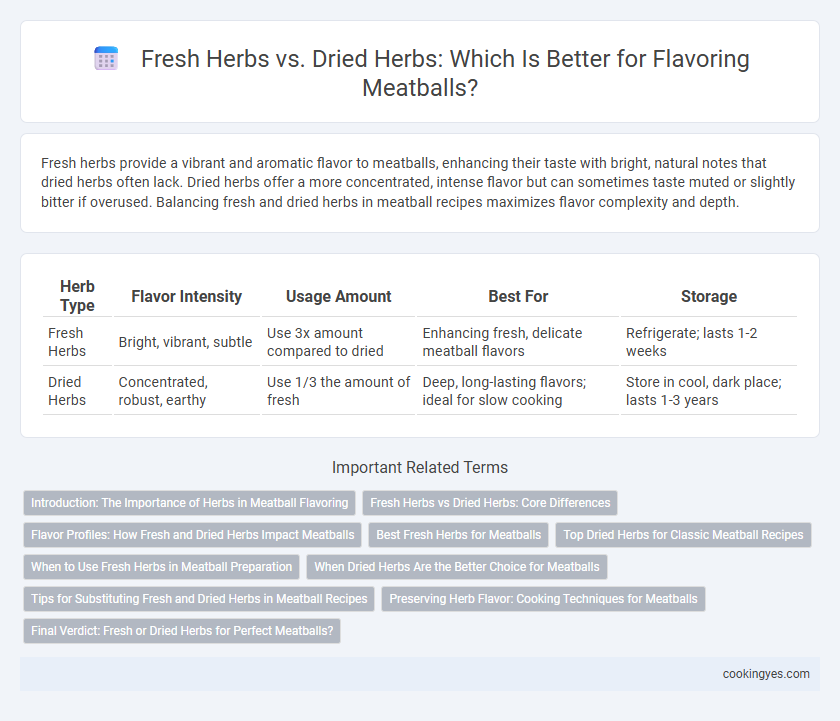Fresh herbs provide a vibrant and aromatic flavor to meatballs, enhancing their taste with bright, natural notes that dried herbs often lack. Dried herbs offer a more concentrated, intense flavor but can sometimes taste muted or slightly bitter if overused. Balancing fresh and dried herbs in meatball recipes maximizes flavor complexity and depth.
Table of Comparison
| Herb Type | Flavor Intensity | Usage Amount | Best For | Storage |
|---|---|---|---|---|
| Fresh Herbs | Bright, vibrant, subtle | Use 3x amount compared to dried | Enhancing fresh, delicate meatball flavors | Refrigerate; lasts 1-2 weeks |
| Dried Herbs | Concentrated, robust, earthy | Use 1/3 the amount of fresh | Deep, long-lasting flavors; ideal for slow cooking | Store in cool, dark place; lasts 1-3 years |
Introduction: The Importance of Herbs in Meatball Flavoring
Herbs play a crucial role in enhancing the flavor profile of meatballs, with fresh herbs such as parsley, basil, and oregano providing vibrant, aromatic notes that brighten the dish. Dried herbs concentrate flavors differently, offering a more intense and earthy taste, which can penetrate the meat mixture deeply during cooking. Selecting between fresh and dried herbs depends on the desired flavor intensity and texture, as well as cooking time and moisture content within the meatball recipe.
Fresh Herbs vs Dried Herbs: Core Differences
Fresh herbs offer vibrant flavor and aroma in meatballs due to their essential oils and moisture content, enhancing the overall taste profile with bright, natural notes. Dried herbs, being more concentrated, provide a deeper, earthier flavor and a longer shelf life but require careful measurement to avoid overpowering the dish. The moisture difference affects texture, with fresh herbs contributing slight juiciness and dried herbs blending seamlessly into the meat mixture.
Flavor Profiles: How Fresh and Dried Herbs Impact Meatballs
Fresh herbs such as parsley, basil, and oregano deliver vibrant, bright flavors that enhance the natural taste of meatballs, providing a more aromatic and lively profile. Dried herbs concentrate flavors with a deeper, more intense herbal essence, often blending seamlessly into the meat mixture to add complexity and warmth. Understanding the balance between fresh and dried herbs allows for customization of meatball flavor profiles, ensuring a perfect harmony between freshness and depth.
Best Fresh Herbs for Meatballs
Fresh herbs like parsley, basil, and oregano provide vibrant, aromatic flavor profiles essential for enhancing meatballs, offering a brighter and more complex taste compared to their dried counterparts. Parsley adds a fresh, slightly peppery note, while basil contributes sweet, fragrant undertones, and oregano introduces earthy, savory hints that complement the meat's richness. Using fresh herbs in meatball recipes maximizes flavor intensity and elevates the overall dish with natural, garden-fresh aroma and complexity.
Top Dried Herbs for Classic Meatball Recipes
Top dried herbs for classic meatball recipes include oregano, basil, and thyme, which provide concentrated, robust flavors that permeate the meat evenly during cooking. Dried parsley and rosemary also enhance meatballs with their earthy and slightly piney notes, complementing the savory profile. Using dried herbs ensures consistent seasoning and a longer shelf life compared to fresh herbs, making them ideal for achieving a balanced and deeply infused meatball flavor.
When to Use Fresh Herbs in Meatball Preparation
Fresh herbs elevate meatball flavor with their vibrant, bright notes best preserved when added toward the end of cooking or mixed directly into the meat before shaping. Ingredients like parsley, basil, and oregano release their aromatic oils and retain freshness when incorporated fresh, ensuring a more dynamic taste profile compared to dried herbs. Using fresh herbs during preparation maximizes their moisture content and enhances the overall texture and flavor intensity of meatballs.
When Dried Herbs Are the Better Choice for Meatballs
Dried herbs, such as oregano, thyme, and rosemary, are the better choice for meatballs when a concentrated and robust flavor is desired, as their potency intensifies during cooking. These herbs withstand the long simmering or baking process without losing their essence, infusing meatballs with a deep, earthy aroma. When using dried herbs, it's essential to rehydrate them in warm water or broth before adding to the meat mixture to release their full flavor potential.
Tips for Substituting Fresh and Dried Herbs in Meatball Recipes
When substituting fresh herbs with dried herbs in meatball recipes, use one-third the amount of dried herbs as fresh to avoid overpowering flavors. Fresh herbs like parsley and basil add vibrant, bright notes, while dried herbs provide a more concentrated, earthy taste that melds well during cooking. To maintain optimal flavor balance, add dried herbs early in the cooking process and fresh herbs toward the end for a fresh, aromatic finish.
Preserving Herb Flavor: Cooking Techniques for Meatballs
Fresh herbs such as parsley, basil, and oregano release vibrant oils that enhance meatball flavor when added towards the end of cooking, preserving their aroma and bright taste. Dried herbs, like thyme and rosemary, benefit from early incorporation into the meat mixture or simmering sauce to rehydrate and infuse depth without overpowering the dish. Utilizing techniques such as folding fresh herbs gently into the meat and simmering meatballs in sauce allows optimal extraction of flavors while maintaining the herb's natural intensity.
Final Verdict: Fresh or Dried Herbs for Perfect Meatballs?
Fresh herbs provide a vibrant, bright flavor that enhances the natural taste of meatballs, while dried herbs offer a concentrated, intense aroma that infuses the dish deeply during cooking. Choosing fresh parsley, basil, or oregano gives a subtle, aromatic lift, making meatballs taste lighter and more fragrant. For a robust, well-rounded depth, dried herbs like thyme, rosemary, and marjoram dissolve slowly, making them ideal for long-simmered meatball sauces or baked dishes.
Fresh Herbs vs Dried Herbs for Meatball Flavoring Infographic

 cookingyes.com
cookingyes.com